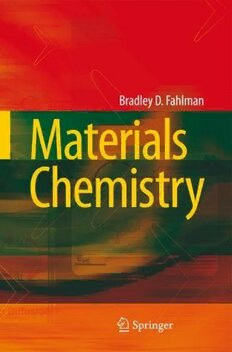
Materials Chemistry PDF
488 Pages·2007·12.107 MB·English
Most books are stored in the elastic cloud where traffic is expensive. For this reason, we have a limit on daily download.
Preview Materials Chemistry
Description:
Winner of a 2008 Textbook Excellence Award from the Text and Academic Authors Association (TAA)! 'Excellent, up-to-date discussion of many classes of materials. Concisely written, understandable with integration of real-world and historical references. Well-illustrated with judicious use of color. Extensive research sections for further study. As a biochemist/chemical educator, I found the text very instructive. A material science engineer at Intel (a friend) gave the book a 'thumbs-up' review.' 'Bradley Fahlman is to be commended for undertaking the challenge of producing what is probably the first true chemistry text in Materials Chemistry. This is a rapidly growing field, along with its spin-off Nanoscience. For producing the first true Chemistry text in a new field, Materials Chemistry, and for its high quality, it is most appropriate that Bradley D. Fahlman be honered with a 2008 Texty Award for Excellence. TEXTY Awards Judges' comments Our current technologically-advanced lifestyles are ever-dependent on advanced materials. In order to continue these developmental efforts to further improve our quality of life, a thorough knowledge of material structures, methods of synthesis, and characterization techniques is essential. However, more relevant to our civilization than incremental progressions in consumer products, radical technologies must be developed in order to address worldwide crises such as environmental pollution/greenhouse effect, dwindling petroleum reserves, and strengthening the homeland security of nations across the world. Materials Chemistry is the first textbook that describes the structure vs. property relationship of all major classes of materials. This book will be suitable for both graduate and advanced undergraduate students, as well as industrial scientists wishing to learn more about particular classes of materials. Many illustrations and detailed bibliographies are provided throughout, as well as special sections that describe emerging applications and pose thought-provoking questions -- all designed to foster student-instructor interactions. Laboratory modules that offer a ''hands-on'' approach for the study of materials are also provided.
See more
The list of books you might like
Most books are stored in the elastic cloud where traffic is expensive. For this reason, we have a limit on daily download.
